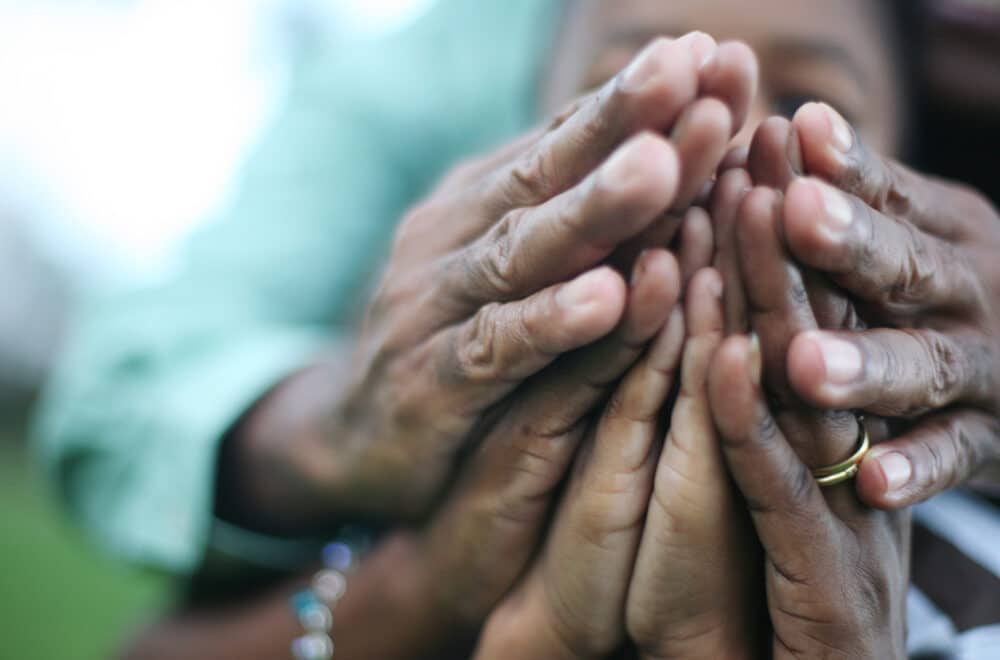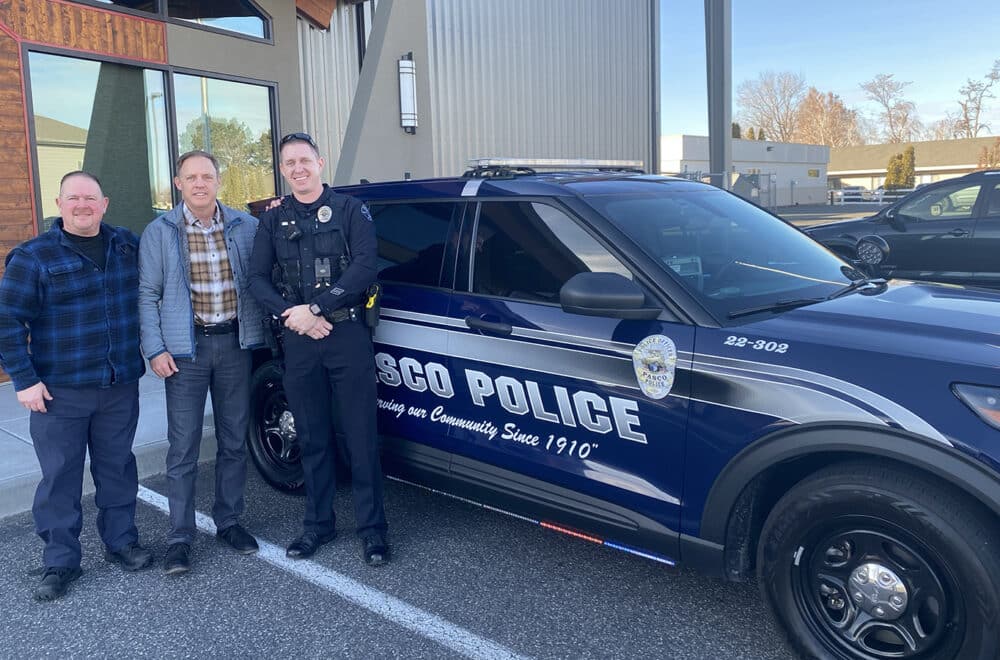Nav Associate Perry Alliman shares his powerful military journey—from Somalia’s war-torn streets to a kitchen table in Alabama.
Perry Alliman’s refrigerator has wings.
So far, ten Army pilots have presented Perry and his wife, Debbie, with their aviator name tags-turned-kitchen-magnets—symbolic gifts of thankfulness for the Alliman’s discipleship, intentional love, and commitment to living the Gospel, whatever comes.
After seven years discipling men and women in the military, many times in their kitchen, this seems a fitting tribute. Perry, a decorated combat veteran and Nav Associate, says that his callings—both as soldier and as Christ-follower—have been providential pursuits.
Lifelong Dream
“I almost always wanted to be in the military,” Perry says. “It was in my heart.”
Perry spent countless childhood hours playing “army” and building model airplanes. When he got a little older, he bypassed a music scholarship to join the Army, feeling college wasn’t for him. Perry officially joined the military in 1980, as an air traffic controller.
“There was no getting out of school,” Perry jokes. “It was just a different kind. A more difficult, more regimented kind. But I took to it.”
He spent the next decade as a controller, and served in the Army for a total of 25 years before retiring in 2005. “I wouldn’t trade it for anything,” Perry says.
For Perry, who was born in Jamaica and moved to Brooklyn at age nine, military service opened big doors. “For an immigrant kid to be able to fly Black Hawk helicopters and see the world—I don’t think that would have happened any other way,” he says. “It was a tremendous experience.”
Spiritual Victory
Finding God wasn’t part of Perry’s military career plan. That happened six years into his service, at a marriage enrichment retreat in Germany. He and Debbie received Christ on the same day, and it changed everything.
“Initially, I was living like everybody else lived, but because of a couple of guys’ influence in my life, I came to Christ,” Perry says. “We started to see what real friendship was and what real fellowship was, and what it meant to be in a family of believers.”
Discipleship played a key role in the Allimans’ first years of faith, and set them on a course for generational impact.
“One of the guys at the marriage retreat was an Army dentist, and he took us under his wing and started discipling us,” Perry says. “Had he not done that, I don’t know what my faith would look like.”
Just a few years later, Dale Shrader—a Navigator Perry credits with saving his life—stepped into Perry’s world.
Perry met Dale in Somalia in 1993, at a Navigator Bible study Dale was leading. After some small talk, the two realized they were slated to fly together as pilots, and would soon share living quarters.
“We made fast friends right there,” Perry says.
Dale says his bond with Perry was forged not only by the trauma they walked through together, but by their brotherhood in Christ.
“I had been in-country for over six months, and there was almost no Christian fellowship,” Dale says. “I remember crying out to God in my quiet time, longing for someone to run beside me. When Perry told me he was a believer, at that moment, I just remember praising God and thanking Him. I thank God for Perry all the time.”
In addition to leading the weekly Bible study, Dale and Perry made themselves available to fellow soldiers for counseling and prayer. Nightly mortar attacks frazzled nerves, and comrades often sought the help of a faithful soldier to make it through the intense anxiety of duty.
Perry would soon learn just how God-sent his new friend Dale would be.
The Other Black Hawk Down
Perry and Dale had been flying together for two months, serving a tour at the height of tensions in Somalia. The nation was enveloped in civil war, and in the middle of a severe famine.
“We went into the situation to stop the starvation,” Perry says. “After President Clinton took office, he agreed with the United Nations to extend the mission into a representative form of government. That did not sit well with Mohamed Farrah Aidid. So he went on the offensive against the U.N.”
September 25, 1993, began with a simple “show of force” mission. Dale and Perry flew their 9-101st Airborne Division aircraft across the enemy landscape, sending rebels a strong message. We are watching you. Watching bases, watching for mounting attacks. The mission was going smoothly.
Then they stopped at around 2:00 a.m. to do a “hot” refuel—refueling while leaving the Black Hawk running.
Somalis fired three mortars at the aircraft, exploding mere feet away.
“By the time the last one hit, our Crew Chief, Sergeant Williams, unhooked the aircraft from the refuel point,” Perry says. “He jumped back in the aircraft and we flew.”
After landing again, they assessed for damage, and appeared to be okay. Soon, they were airborne, searching for those responsible. Rebels would find them first.
On their way back to safety, at about 100 feet from the ground, traveling between 130 and 140 miles per hour, disaster struck hard. It was an overcast night, which meant light sky against dark helicopter.
“That’s like having a white light over you,” Perry says.
It was an easy shot. A rocket-propelled grenade hit the Black Hawk’s belly, causing a massive explosion. They did a diving right turn, and crashed into the street.
“A fireball rolled over us inside the aircraft,” Perry remembers. “Somehow I got out through the windshield, and I met Dale off the front of the aircraft. I told him I was burned really bad.”
“Really bad” ended up meaning a full third of Perry’s body, face included. Dale’s shoulder and right side of his face were also burned. Perry’s face, which hit a panel on impact, suffered other major damage. The orbital bone of his right eye was broken, his jaw was broken, his sinuses crushed.
Dale sat Perry down and went back for their three comrades.
“The fire was already in our seats, so there was no way to get them out,” Perry says. “The last thing Dale said he saw was Sergeant Williams trying to climb out of his seat and come up to us through the center console.” He didn’t make it. None of the other men survived.
Dale returned alone, and guided temporarily blinded Perry down an alley. They attempted to radio for help, but one radio was broken, and the other missing. Hearing two Somalis coming, they quickly stuck their flashlight in the dirt. Laying in the dark, they watched the two Somalis pass by. They came back, and spotted Dale.
The rebels tossed a hand grenade. Dale fired a round to push them back. More hand grenades. This went on for about an hour.
Then they ran out of ammunition.
“Once we were out of ammo, Dale came over to me and knelt down,” Perry remembers. “He prayed, ‘Lord, forgive me for not sharing Christ with more people, but we’re ready to come home now.’ ”
He finished praying. Then came the shouting.
“American boys, American boys!”
A Somali boy was standing in the alleyway. Dale went out to him, cautiously, warning that he had a gun.
“The kid just pointed down the street—and down the street was an armored personnel carrier from the United Arab Emirates,” Perry says, the relief still lingering in his voice.
“Dale got me up, and they got us out of there.”
Most of Perry’s recollections of that night come second-hand—Dale remembers far more of the details. Some memories, mercifully, are little more than shadows.
Perry endured six weeks in the hospital, six surgeries, multiple skin grafts, and six months of physical therapy.
Perry’s healing process was miraculously quick, and he returned to duty only five months after the crash in Somalia. Dale was back in the air even sooner.
“When I first came to Christ, one of the couples we were working with told me to read the book of Job,” Perry says. “He said, ‘You need to read it, and you need to understand it. Because bad things happen to good people.’ That’s what I held onto when I was in the hospital—the Lord has given, the Lord has taken away, may His name be praised (see Job 1:21).”
Perry still has problems with his vision. His skin grafts can’t sweat, so he overheats easily and must stay hydrated. He can’t feel the right side of his lip, and has lost some feeling in his right arm. But there seems to be no end to his God-given optimism.
“It’s nothing that stops me from having a full life,” he says. “I don’t like fireworks, though!”
Many people ask Perry if he ever asks God why this happened to him. He never has.
“It’s actually deepened my faith,” Perry says. “It’s made me confident that no matter what happens, He is in control. If He wants me alive, there is nothing anybody can do to stop it. It’s given me tons of confidence to really go anywhere and do anything that He’s calling me to do, without fear of it ending badly.”
Perry’s Black Hawk went down 20 years ago, eight days before the infamous “Black Hawk Down” incident in the same area, later captured in a book and Academy Award-winning film by the same name.
“I’m still sad about my guys that died,” Perry says. “I lost three guys.”
It would be understandable to succumb to fear and bitterness after walking through such darkness. But Perry, who served 10 more years after his accident, and even served in Iraq, doesn’t see life that way. He sees what God continues to do through his life, and every experience that “interferes” with it. He sees his chance to impact the next generation of soldiers for Jesus. Because it’s all about Him anyway.
“In a lot of ways, the military is kind of a dark place,” Perry says. “If a young guy doesn’t figure out how to walk in fellowship and come to Christ, he could easily slip away.”
That’s the field where Perry continues to lay everything down.
Life Exchange
Perry currently leads one of The Navigators strongest ministries led by a Nav Associate, working as a Department of the Army Civilian and Course Manager for the Aviation Safety Officer Course, while leading Navigator ministry mostly among helicopter flight school students at Fort Rucker, a U.S. Army base in Alabama. Since retiring from active duty, Navigator discipleship has given Perry new opportunities to reach the military community for Christ.
“On Wednesdays, I get to see 60 to 100 students who are in training here,” Perry says. “I get to interact with these guys one-on-one, or in groups of two or three. I’m able to share the Gospel with them, or just help them with general counseling.”
Perry and Debbie, who have three adult children of their own, also teach Bible studies and invite students over for fellowship in their home. Inevitably, they grow very close to the students in their care.
“They are very transient, and the time we have is very limited,” Perry says. “We invest pretty heavily in them, and then they leave. I kind of see us as a sending ministry. We hope to get them established in their walk, and then when they leave, they’ll plug into another ministry.”
Perry’s office bulletin board is filled with pictures of students who have left the nest.
“It’s a great joy to see them go, but it’s hard that they have to leave because we love them,” Perry says. “Sending them out is fun, but it’s also probably the most difficult thing for us.”
The joy far outweighs the difficulty, Perry says.
“I love watching a guy or girl get the vision,” Perry says. “If they love people, then they should be sharing the Gospel.”
Two years ago, a young woman named Caroline came to Christ in their living room, and Debbie discipled her for a year and a half. In fact, Debbie now leads all of the women in their ministry, working alongside her husband after years supporting him from an ocean away. Young ladies like Caroline are the fruit.
“That’s probably about as special as it gets,” Perry says.
Military ministry has also given Perry a chance to impact the world without leaving home.
“I may have a class with two or three Saudi students in it, or a Turkish student,” Perry says. “I can have them over to the house, and we can talk about Jesus, without me even going to China, or Saudi Arabia, or Turkey.”
For the Allimans, the tour of duty is never over.
“One of the things I’m learning is that it’s very possible to have a full-time job and do full-time ministry,” Perry says. “I would love to see everyone in ministry get the vision that this is not a thing you do for a season.”
Perry doesn’t think he’ll ever retire from ministry. “We’ve found what we want to give our lives in exchange for,” Perry says. “It is other people. And we’re having tremendous fun.”
For Perry and Debbie, life is most full when it is full of mercy and sacrifice. Dinner table crowded, bulletin boards full of faces, refrigerator doors covered in wings.




This is totally an awesome work of God alone. I remember this couple from Fulda, Germany. I pray many continuing blessings God may bring to your ministry endeavors. PEACE 🙌🏾